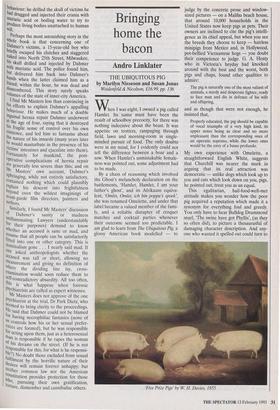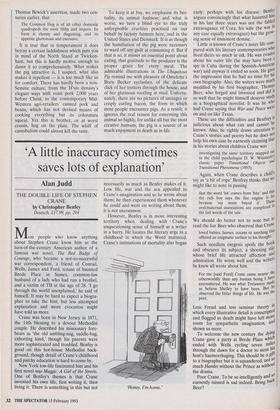Bringing home the bacon
Andro Linklater
THE UBIQUITOUS PIG by Marilyn Nisseson and Susan Jonas Weidenfeld & Nicolson, f16.99, pp. 136
hen I was eight, I owned a pig called Hamlet. Its name must have been the result of schoolboy precocity, for there was nothing indecisive about the beast. It was appetite on trotters, rampaging through field, lawn and morning-room in single- minded pursuit of food. The only doubts were in my mind, for I evidently could not tell the difference between a boar and a sow. When Hamlet's unmistakable female- ness was pointed out, some adjustment had to be made.
By a chain of reasoning which involved the Ghost's melancholy declaration on the battlements, 'Hamlet, Hamlet, I am your father's ghost', and its Afrikaans equiva- lent, `Omlet, Omlet, ich bin poppa's spoek', she was renamed Omelette, and under that label became a valued member of the fami- ly, and a reliable disrupter of croquet matches and cocktail parties whenever their outcome seemed too predictable. I am glad to learn from The Ubiquitous Pig, a glossy American book modelled — to judge by the concrete prose and window- sized pictures — on a Malibu beach house, that around 10,000 households in the United States now keep pigs as pets. Their owners are inclined to cite the pig's intelli- gence as its chief appeal, but when you see the breeds they choose to keep — hairless minipigs from Mexico and, in Hollywood, pot-bellied Vietnamese hogs — you doubt their competence to judge. G. A. Henty who in Victoria's heyday had knocked around with the best and the worst, both pigs and chaps, found other qualities to admire: The pig is naturally one of the most valiant of animals, a sturdy and desperate fighter, ready to face man and die in defence of his wife and offspring, and as though that were not enough, he insisted that, Properly educated, the pig should be capable of vocal triumphs of a very high kind, its upper notes being as clear and no more unpleasant than the corresponding ones of an operatic soprano, while the lower ones would be the envy of a basso profundo.
My own experience with Omelette, a straightforward English White, suggests that Churchill was nearer the mark in arguing that its real attraction was democratic — unlike dogs which look up to you and cats which look down on you, pigs, he pointed out, treat you as an equal.
This egalitarian, hail-food-well-met attitude makes you wonder how the poor pig acquired a reputation which made it a synonym for everything foul and greedy. You only have to hear Bulldog Drummond snarl, 'The swine have got Phyllis', (as they so often did), to picture a thesaurusful of damaging character description. And any- one who wanted it spelled out could turn to
`Five Prize Pigs' by W. H. Davies, 1855 Thomas Bewick's assertion, made two cen- turies earlier, that
The Common Hog is of all other domestic quadrupeds the most filthy and impure. Its form is clumsy and disgusting, and its appetite gluttonous and excessive.
It is true that in temperament it does betray a certain laddishness which puts you in mind of the North Stand at Twicken- ham, but this is hardly motive enough to damn it so comprehensively. What makes the pig attractive is, I suspect, what also makes it repellent — it is too much like us for comfort. There has hardly been a non- Semitic culture, from the H'siu dynasty's elegant ways with roast pork 2,000 years before Christ, to the contemporary Mid- Western agri-retailers' canned pork and beans, which has not devised means of cooking everything but its coloratura squeal. Yet this is brother, or at worst cousin, hog on the plate. The whiff of cannibalism could almost kill the taste.
To keep it at bay, we emphasise. its bes- tiality, its animal foulness; and what is worse, we turn a blind eye to the truly unforgivable cruelties practised on our behalf by factory farmers here, and in the United States and Denmark. It is as though the humiliation of the pig were necessary to ward off any guilt at consuming it. But if that is so, it misses an essential point about eating, that gratitude to the producer is the proper grace for every meal. The admirable illustrations in The Ubiquitous Pig remind me with pleasure of Omelette's Boris Becker eyelashes, of the delicate click of her trotters through the house, and of her glutinous rootling in mud. Unfortu- nately, there are no pictures of sausages or crisply curling bacon, the form in which most people encounter pigs. As a result, it ignores the real reason for esteeming this animal so highly, for unlike all but the most creative humans, the pig is a source of as much enjoyment in death as in life.



















































 Previous page
Previous page